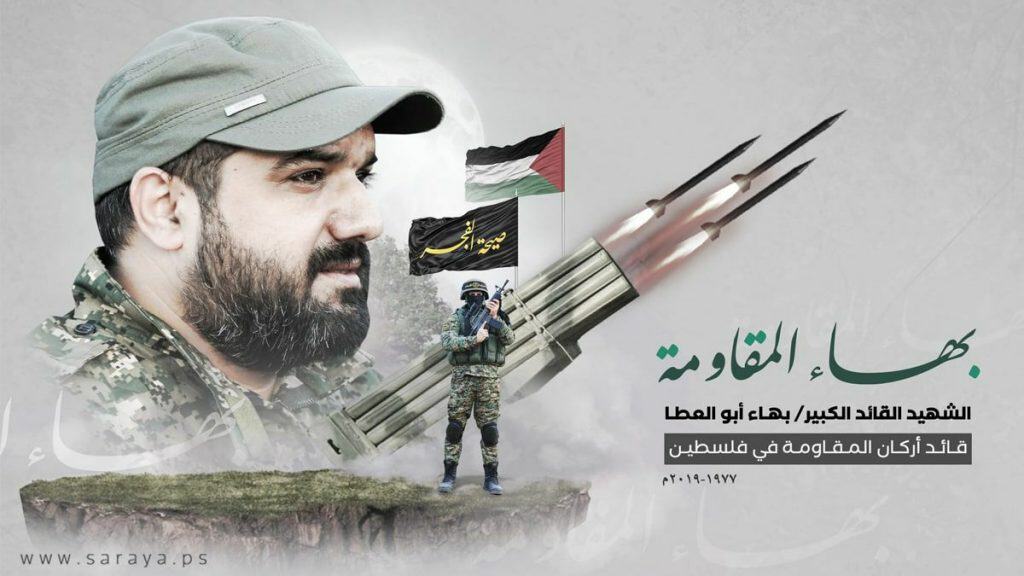
The targeted killing of Palestinian Islamic Jihad commander Baha Abu al-Ata a year ago was a victory for the Israeli defense establishment but it did little to change the overall level of conflict between Israel and Palestinian militant groups in Gaza.
On Nov. 11 2019, a joint operation by the Israel Defense Forces (IDF) and Shin Bet successfully targeted and killed the Saraya al-Quds commander and his wife as they slept on the top floor of their northern Gaza home.
Al-Ata had long been a target of the IDF and Shin Bet. During Operation Pillar of Defense in 2012, the IDF failed to kill al-Ata when it bombed a building suspected of hosting a meeting of PIJ commanders. In 2014, during Operation Tzuk Eitan, Israel’s Air Force bombed al-Ata’s home in Gaza City but he managed to survive.
After the 2014 war, Israel’s interest in al-Ata seemed to fade but a series of notable attacks in 2019 against IDF soldiers and communities in southern Israel renewed Israel’s effort to eliminate al-Ata.
On Jan. 22 2019, an IDF Paratroopers Brigade commander was struck in the head by a bullet fired by a PIJ sniper. The bullet hit the officer’s helmet without causing him serious injury. The group later published footage of the incident on Hezbollah-affiliated news network Al-Mayadeen.
On Sept. 10 2019, during an election rally in the southern Israeli city of Ashdod, Netanyahu was giving a speech to supporters as rockets were fired toward the city. The attack prompted security personnel to rush the Prime Minister off the stage as television cameras recorded the event.
Al-Ata’s killing removed a threat but did it achieve deterrence?
This is a question that produces a combination of answers.
Al-Ata was responsible for multiple attacks and undermined attempts by the Israeli government and Hamas to achieve an understanding of calm between the two sides.
After the killing of al-Ata, the IDF’s Chief of General Staff Aviv Kochavi remarked the PIJ commander “undermined the quiet in southern Israel” adding that he “acted in every way to sabotage attempts for calm with Hamas. He was a living ticking bomb, and up until today worked and planned attacks. He was responsible for the majority of attacks that took place over the past year.”
As a result of the killing, Israel and Hamas were able to reach several agreements without being undermined by al-Ata’s repeated cross-border attacks. This ushered in several periods of calm in Gaza and southern Israel not seen since the start of the March of Return in early 2018.
However, these agreements were short lived, not lasting more than three months before militants from the various Palestinian factions resumed attacks.
A three-day conflict between Israel and PIJ in February, several campaigns of incendiary balloon assaults against communities in southern Israel including sporadic rocket fire indicates al-Ata’s killing may not be have been as beneficial as Israeli security officials had hoped for.
Indeed, removing al-Ata from the equation allowed several Egyptian-brokered understandings of calm between Israel and Hamas but it didn’t achieve a cessation of attacks from the Gaza Strip.
Israel’s use of targeted killing can produce positive results but it may not deter or change the strategy of militant jihadist groups. In fact, it may produce the opposite result, as Israel experienced after the 1992 targeted killing of Hezbollah’s Secretary-General Abbas al-Moussawi, who was replaced by Hassan Nasrallah, a more radical and dangerous figure than his predecessor.
The result of al-Ata’s killing is a mix of success and failure. Israel was able to remove a threat it perceived as imminent but it failed to deter PIJ and other militant groups from continuing to launch attacks from the Gaza Strip.







